Artificial intelligence AI is both an impact and an opportunity for the film industry, so don’t be afraid to hug more and talk about it in the industry.
In February of this year, OpenAI, an artificial intelligence research company, released Sora, a large model of artificial intelligence text generation video. This artificial intelligence system can quickly produce one-minute videos, which can present complex scenes with multiple characters, specific types of actions and accurate details of the theme and background. In March, a feature-length sci-fi movie "Our Terminator Reset Edition" made entirely by AI premiered offline in the United States.

"Our Terminator Reset Edition" has premiered offline in America.
In recent years, with the continuous change of AI technology, the film and television industry has increasingly felt the crisis. Last year, Hollywood writers went on strike, and one of the contradictions was that AI could generate scripts, which threatened the rights and interests of writers. The screenwriter is only one of the affected parts. In an interview with the Beijing News, film and television practitioners revealed that jobs such as atmosphere painters and lens splitters were more impacted by AI.
Will AI threaten or even subvert the film and television industry? The Beijing News interviewed Zhang Nan, a young film director /AI creative artist, and Wang Yu, a photography director (masterpiece "Gods Trilogy" and "Golden Age"), and asked them to talk about the opportunities and challenges of AI to the film and television industry. In Wang Yu’s view, although AI technology is constantly iterative and updated, and the technology is becoming more and more mature, it is not life after all and cannot replace the part of human emotion. "Man Jiang Hong" screenwriter Yu Chen said:"Human beings will have limitations and be easily emotional, and our emotional’ defects’ or even’ shortcomings’ are precisely where art meets us".In the face of the menacing AI, Zhang Nan feels that every department in the industry should learn and embrace it with a positive attitude.
It has the greatest impact on the basic production level of the film and television industry
Some time ago, Zhang Nan watched the clip of "Our Terminator Reset Edition" produced by AI. "I feel that it is more like a performance art, and its perception is definitely not as good as that of a real-life movie, but it puts forward the possibility that the movie made by AI can be close to the work made by a real person in terms of atmosphere or overall perception."
Zhang Nan began to pay attention to AI very early. In 2022, an AI painting tool, Midjourney, was launched abroad, which can directly generate pictures with words. At that time, Zhang Nan had an intuition that AI would definitely bring an innovation in the image industry, so he quickly studied the technology of generating pictures from words and generating videos from pictures. Basically, he has used all kinds of AI tools on the market, which is considered as a group of people who used AI earlier.
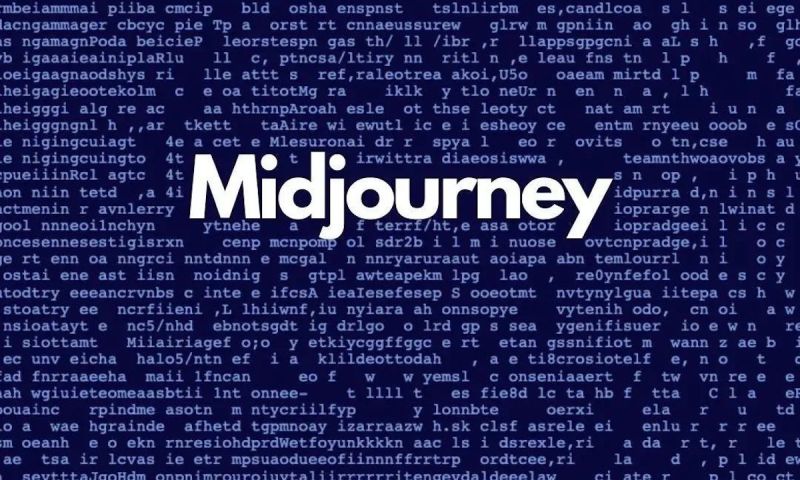
The AI painting tool Midjourney has been updated to the sixth generation.
In Zhang Nan’s view, the update iteration of AI technology is particularly fast. Last year, some information was sent every two or three weeks, and it was usually updated once a month or two. Take Midjourney as an example, the product has been updated to the sixth generation, and the seventh generation is also being announced in advance. It is said that there will be functions comparable to Sora. The rapid development of AI technology has had a direct impact on the film and television industry.
Zhang Nan thinks that at present, the occupations that AI has the greatest influence on the film and television industry are atmosphere painters and lens splitters, and this most intuitive design department may suffer the greatest impact. In the past, it took five people to draw a film split, and it took a month or two to draw a film split. Now ChatGPT can make a more accurate split. Before making a better atmosphere map, the cost of a map should reach 10 thousand yuan, and the cost of all kinds of communication time is also very high, so the time and funds are burning. And this is a very key department, once the atmosphere map in the early stage is not good, it may affect the future shooting and the reference of the visual effects department in the later stage. However, with AI, hundreds of atmosphere maps can be generated relatively quickly, and finally, one is chosen to continue to optimize the details based on the main creation aesthetics. The whole link is clear, which greatly saves time and manpower for each department.
With the further development of AI, photographers, composers, actors and visual effects departments are under greater pressure. Zhang Nan made several videos with AI, that is, composing music with AI, "which can reach the level I want".The photography department doesn’t need to shoot, and it doesn’t need to find an outreach to see the scenery. What kind of scenery is needed, AI can make it, saving a lot of costs. Actors may also be replaced, and now AI is developing rapidly in character micro-expressions and lines. In the later visual effects department, AI digital landscape painting can be done now, and the model problem will be solved as soon as possible when the computational power is improved. The animation department in the later period has been hit hard, because it is not necessary to adjust frame by frame, and many animation software has also joined the AI module.
With the layered iteration of AI technology, it may hit the director and screenwriter level in the future. Zhang Nan said that the so-called impact does not mean that you will definitely lose your job, but that AI will impact the work itself. Nan made an analogy. In the past, when the car came out, the coachman didn’t lose his job. Many people went to drive the car, but the horse was unemployed. After AI technology comes out, some people will definitely be impacted, but as long as they study and transform seriously, they will still do better than inexperienced people.
According to photographer Wang Yu, with the development of AI technology, the more basic it is in the film and television industry, the easier it is to be replaced. The innovation of AI technology is like the industrial revolution, but it is faster than the industrial revolution, and it is a geometric growth. It is difficult for a person to see 1000 movies for reference, but AI will be very fast, and the communication cost will be greatly reduced and the speed will be greatly improved.
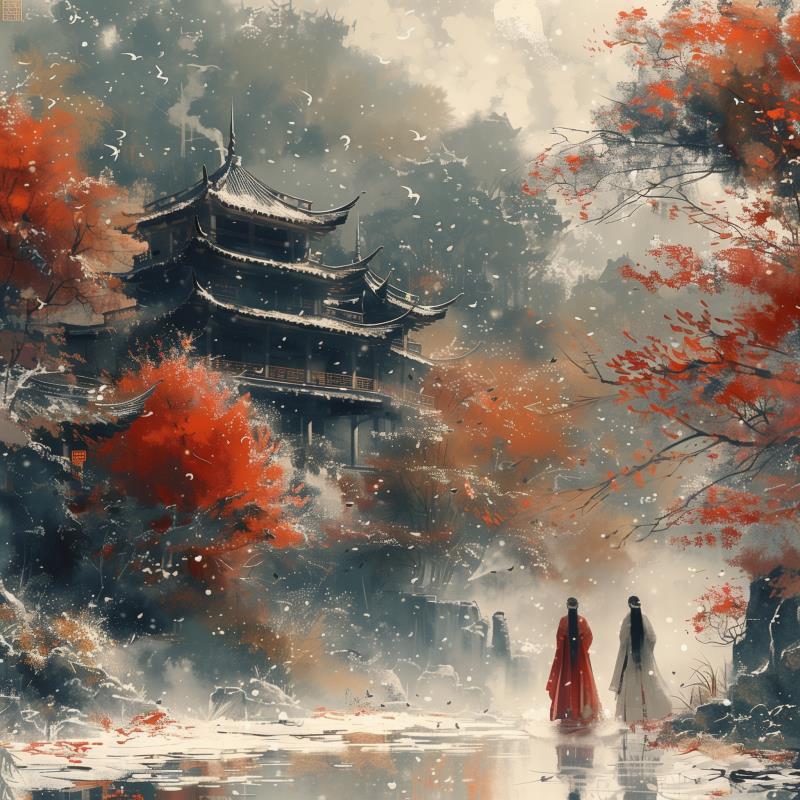
An atmosphere map full of China traditional artistic conception made by AI. Cartography Zhang nan
Take the photography department as an example. Before the film was digitized, only the photographer knew what he was shooting. After the digitization, the department heads and producers of this group all knew what he was shooting and could judge it, which changed the logic of shooting. After the green screen shooting, the photography department needs to communicate with other departments, and there are many unknown and uncontrollable factors. But when virtual shooting in the future, it will change a creative way and imagination path, and photographers should learn this knowledge in advance.
At that time, when filming the trilogy of gods, the crew tried virtual shooting, but it failed for various reasons. As a photographer, Wang Yu said that all the visual effects shots and action shots were basically previewed dynamically, but they were two-dimensional and rough, and the effect would be more realistic with the help of AI.
What cannot be replaced is human emotion.
In Zhang Nan’s view,At present, the people who are instructive in aesthetics in every department of the film and television industry are irreplaceable by AI. In the future, AI may be able to replace some pure human departments, such as mechanical departments, equipment departments and Weiya departments, but department heads cannot be replaced because AI has no aesthetic judgment. Is this picture aesthetic or even market demand? In the end, it’s up to someone to make a decision."To take an extreme example, in medicine, AI can’t sign for relatives to take risks, and the ultimate responsibility still needs to be borne by people." Zhang Nan said that at present, it is impossible for all departments in the film and television industry to be replaced by AI, but people’s work places have changed. Maybe art doesn’t need to go to the scenery all day and hand it over to AI, but whether this scene is approved by the director or the art design will finally be left to the creative director to choose.
Wang Yu believes that although AI technology is constantly being iteratively updated and matured, it is not life after all, but it is unintentional."AI still depends on people to command, it can’t replace people’s hearts, this is the most fundamental place",Wang Yu said, AI will always be a tool, just saying how far this tool can develop in the end. Just like in Nolan’s film Oppenheimer, before the atomic bomb initiation test, General groves asked Oppenheimer, "What is the probability that we will destroy the world?" Oppenheimer replied, "Almost zero." AI is the same problem. Even if AI relies on unlimited data calculation, it can’t reach the emotional depth of live-action movies in the end.
Yu Chen, the screenwriter of "Man Jiang Hong", said in an interview with the media a few days ago that AI will not make mistakes in language logic, but it will be relatively rudimentary in content logic, so it is difficult to create a stable story with causal development, and it cannot reach the level of narrative art.. Maybe in the next few years, it will become a very important tool, because its computing power is unmatched by human beings, but when it comes to emotions and values, AI will be make a fool of oneself. In Yu Chen’s view, the closer to the level of comprehensive thinking and planning, the more difficult it is for AI, and the more specific work, the easier it is to be replaced.
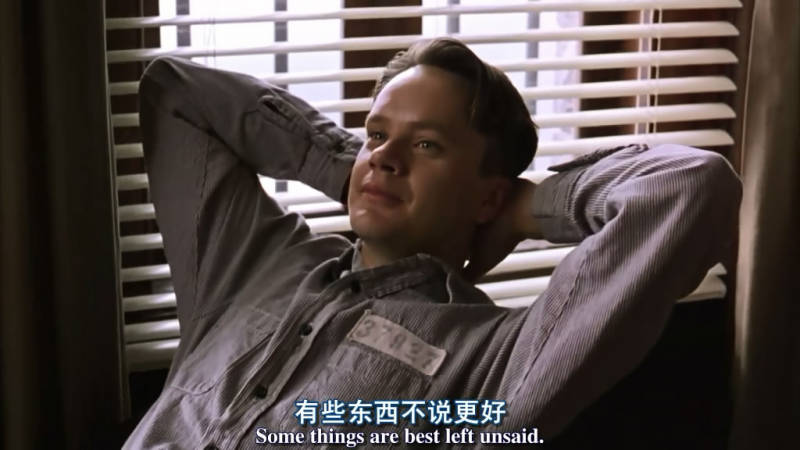
In the movie "The Shawshank Redemption", the hero Andy plays the opera in the broadcast room of the prison. Because it touches human nature, AI is difficult to create at present.
Yu Chen cited a passage from the movie The Shawshank Redemption as an example: Andy, the hero, regardless of the penalty, went to the prison broadcast room to play Mozart’s opera "The Wedding of Figaro", and the inmates outside were hit by this sudden song and immersed in it. Logically speaking, it doesn’t make much sense for Andy to do this, because he will definitely be beaten and grounded afterwards. It is difficult for AI to create such a paragraph that touches human nature. Yu Chen said:"Human beings will have limitations and be easily emotional, and our emotional’ defects’ or even’ shortcomings’ are precisely where art meets us".
In Yu Chen’s view, asking questions will be a very important ability. In the future, a very important career may be an AI questioner. It is particularly important to be able to ask questions well and come up with very effective and interesting results.
It may be too early to say that AI technology will subvert the film and television industry.Sora has just broken through the limit of making a one-minute video, but it is still not stable, and it is still far from making a film with pictures, stories and characters, especially a feature film with thoughts and feelings.Technology will not only replace some tools, but also create new industries and new jobs. As long as AI has no independent consciousness, all subjective content will eventually fall on people. The film and television industry welcomes the embrace of new technologies. As long as ideas are unique, they cannot be replaced, because the most fundamental difference between humans and animals is that they can use and make tools.
Will give different aesthetic works for individuals.
So far, Zhang Nan has made six short videos with AI. "When I made the first film, AI was still not perfect, and then it got better and better. You can see from the videos I made that AI technology is really developing." Recently, Zhang Nan released these short videos in bilibili under the screen name of "Little Bear", and the number of hits of the album has exceeded 200,000.
These two or three-minute videos are almost all made through AI, including music. Dubbing is done by Zhang Nan’s voice plus the voice generated by AI. He usually takes time to do a little, and he can do it in a week at the latest. If he concentrates on it, he can finish it easily in two or three days, but he still needs fine tuning.
Zhang Nan thinks that AI has another advantage, that is, when making videos, you don’t have to think clearly before you start, because AI will give you some inspiration. For example, you have an idea in your mind, but you haven’t figured out the specific picture yet. After AI gives a specific picture, you can always adjust your idea according to the details inside, which is a kind of communication and promotes the progress of thinking.
In Zhang Nan’s latest video "Revenge of the Prince of the Meow Star Right Tour" made with AI, there are two shots with real material. He wants to try to put AI and the real shot together, and will it be inconsistent in perception? The result proves that the viewer can’t see it at all. "Although AI is immature at present, it is entirely possible if we use real shot plus AI to complete a movie." Zhang Nan specially emphasized.
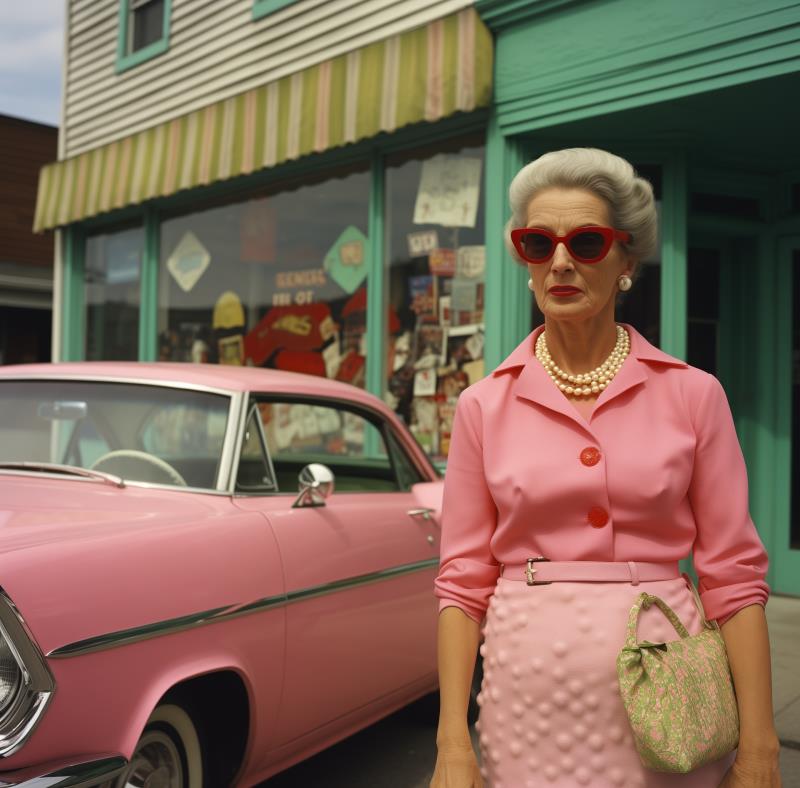
Film and television atmosphere map made by AI. Cartography Zhang nan
Regarding the concept that AI is a super tool, Zhang Nan felt that he didn’t quite agree with it in the process of using AI. "If it is a tool, I will build an axe, fully knowing that this axe will help me cut down trees, but AI is not, because it is multimodal, can adapt to different industries, has a set of neural networks, can think and even learn by myself." Zhang Nan said that communication with AI should not attempt to control it with data, but communicate.
For example, enter a string of words: a bird is flying in the sky. AI will give many answers, such as how to fly, cloudy or sunny, day or night, and then when you enter the artistic description, you may need to improve your aesthetics, know roughly which artist’s artistic style you want to learn, and then tell AI, AI will search the world’s works about this artist and get what you want. The next time AI generates a similar diagram for you, it will actually know your aesthetic tendency with great probability."AI is also learning a little bit. The same prompt, what I made with my own AI is different from what my friends did."
Zhang Nan thinks,AI will give different aesthetic works for everyone. Therefore, this requires creators to read a lot of books and look at aesthetic things, instead of letting AI guide people. Otherwise, the works made by AI are beautiful, but they are not attractive.Zhang Nan said that as a film, it is very important to return to its textuality and literariness. It is impossible to fool the audience casually. There are too many beautiful things that the audience will see in the future, but thoughtful works are still rare. It depends on how you do it.
Embracing AI with an open attitude may be a brand-new opportunity.
In Zhang Nan’s view, AI will definitely set off a wave of technological revolution, and the film and television industry will bear the brunt. Because all AI shows are mainly images now, this form is the most intuitive and represents people’s basic image demands. In fact, the biggest impact of AI is not film and television, but it is a real big change in politics, economy, science and technology, and military affairs. AI is like a big pipeline, and each department can plug in a straw and draw some of what it needs.
In the face of the fierce AI, Zhang Nan feels that every department in the film and television industry should study it, and use it first without learning too well. "Because no one knows how far AI will develop in the end, whether even the director is not needed in the end, and no one needs it. It is also possible, but we don’t know when that day will come, but now it seems that it will take time."
Zhang Nan has seen a lecture by a representative who is very professional in artificial intelligence in the Asia-Pacific region before. Someone asked him a question: In the face of AI, everyone is very confused. How should we keep our jobs? The man said: Now many scientists all over the world, including sociologists, will be confused. Let’s use it first, then see how it develops, and then let it go.
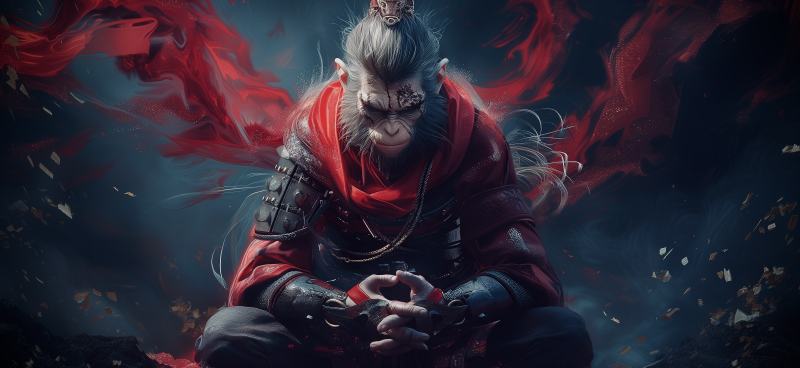
The Monkey King, the Great Sage of Qitian, made by AI. Cartography Zhang nan
At present, the film made by Zhang Nan has started AI intervention, and now many shots are being tested, and the effect is no different from that of real shooting. "In the past six months, it should be impossible for AI to replace the real lens on a large scale, but it will definitely be in the future." After the more advanced AI like Sora comes out, its next generation will definitely be better, which will greatly shorten the film cycle and improve the shooting efficiency. In this way, directors like it, because they can express their ideas intuitively, and investors like it, which can save money and do better.
In Wang Yu’s view, if people make good use of AI, they can get twice the result with half the effort. If they are afraid of it, it will become your yoke. People always use tools, and can’t be commanded by tools. Just like the fire of Prometheus, the use of fire by human beings is a good tool for human beings, but if human beings are used by fire, it will become a disaster.
After AI is involved in the film and television industry, is it meaningless to shoot? Zhang Nan thinks that some different tracks may be formed in the future, such as the recently released Russian space movie Challenge, which has achieved the feat of real shooting in space. This is an effect that AI can’t achieve so far. When paying tribute to art and taking people’s spiritual beliefs as the driving force, only real shooting is meaningful. If you want to make a pure commercial film, there is almost no problem in presenting it in AI mode. In the future, AI movies may be popular and become an artistic product in the era of equal rights in science and technology. Everyone can create them, but the level must be high or low, forming a pyramid structure, and the corresponding track is to create another pyramid with real shots.
For screenwriter Chen Yu,Now is an era in which challenges and opportunities coexist. Whether it is the change of science and technology or the change of society, everyone should go deeper and accept this change, or they will be eliminated. Generally speaking, we should have a more open attitude and a positive attitude to look at AI technology, which can force the creators and eliminate some mediocre creations. From another perspective, this is a brand-new opportunity.
Beijing News reporter Teng Chao
Editor Huang Jialing
Proofread Zhai Yongjun